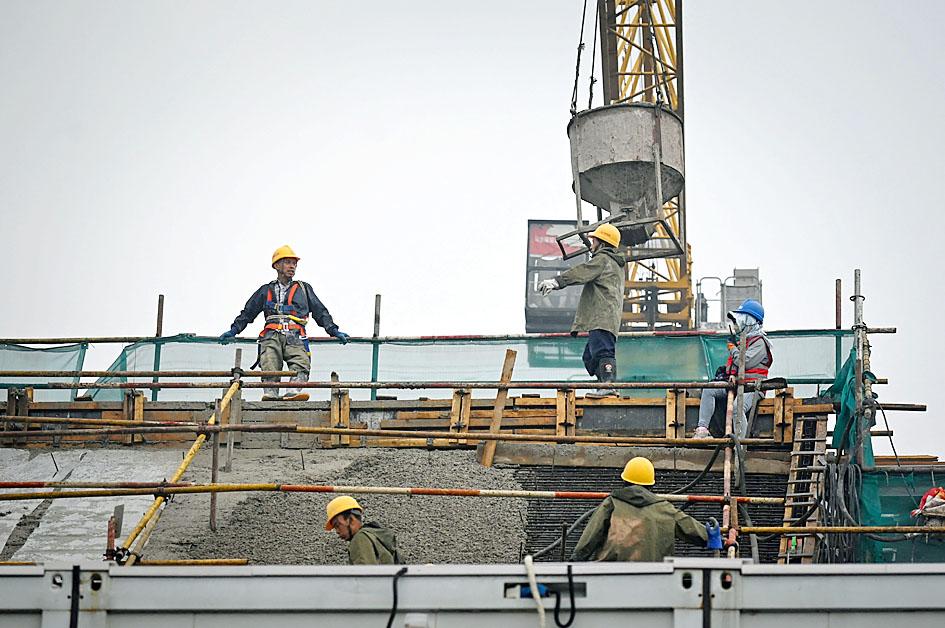China’s economy showed further signs of improvement last month with a strong gain in services and construction as COVID-19 outbreaks and restrictions were gradually eased.
The official manufacturing purchasing managers’ index (PMI) rose to 50.2 from 49.6 in May, the Chinese National Bureau of Statistics (NBS) said yesterday, slightly below the median estimate of 50.5 in a survey of economists.
It was the first time since February that the index was above 50, indicating an expansion in output compared with May.

Photo: AFP
The non-manufacturing gauge, which measures activity in the construction and services sectors, climbed to 54.7, the highest in more than a year and well above the consensus forecast of 50.5.
“The Chinese economy bottomed out in June and the recovery is basically entrenched, although attention still needs to be paid to imbalances between the recoveries in supply and demand,” said the China Logistics Information Center, which publishes PMI figures in partnership with the NBS.
Government restrictions to contain COVID-19 outbreaks gradually eased over the past month. The financial hub Shanghai lifted its two-month lockdown at the start of last month by allowing more shops to reopen, more factories to resume production and for port operations to pick up.
The data suggests “the pace of recovery accelerated as the COVID-19 situation stabilized,” NatWest Group PLC chief China economist Liu Peiqian (劉培乾) said.
There was a “broad based but still soft recovery in both production and new orders,” and the figures show the rebound is still milder compared with the recovery from the Wuhan lockdown in 2020, she said.
Nineteen of the 21 sectors in the service sectors tracked in the survey returned to expansion last month, up from just six in the previous month, NBS senior statistician Zhao Qinghe (趙清河) said in a separate statement.
Gauges of sectors previously hit badly by the outbreaks all improved, such as railway transport, air transport, accommodation, catering and entertainment.
However, the recovery remains fragile as the country sticks to its “zero COVID” strategy, meaning restrictions could be tightened if outbreaks of the highly transmissible Omicron variant of SARS-CoV-2 flare up again.
Chinese President Xi Jinping (習近平) said that the policy was the most “economic and effective” for the country.
Economists are holding firm to their GDP growth forecasts for this year. Growth is projected to be 4.1 percent, well below Beijing’s annual target of about 5.5 percent.
Bloomberg’s aggregate index of eight early indicators showed some improvement last month, although the recovery remains muted.

Stephen Garrett, a 27-year-old graduate student, always thought he would study in China, but first the country’s restrictive COVID-19 policies made it nearly impossible and now he has other concerns. The cost is one deterrent, but Garrett is more worried about restrictions on academic freedom and the personal risk of being stranded in China. He is not alone. Only about 700 American students are studying at Chinese universities, down from a peak of nearly 25,000 a decade ago, while there are nearly 300,000 Chinese students at US schools. Some young Americans are discouraged from investing their time in China by what they see

MAJOR DROP: CEO Tim Cook, who is visiting Hanoi, pledged the firm was committed to Vietnam after its smartphone shipments declined 9.6% annually in the first quarter Apple Inc yesterday said it would increase spending on suppliers in Vietnam, a key production hub, as CEO Tim Cook arrived in the country for a two-day visit. The iPhone maker announced the news in a statement on its Web site, but gave no details of how much it would spend or where the money would go. Cook is expected to meet programmers, content creators and students during his visit, online newspaper VnExpress reported. The visit comes as US President Joe Biden’s administration seeks to ramp up Vietnam’s role in the global tech supply chain to reduce the US’ dependence on China. Images on

New apartments in Taiwan’s major cities are getting smaller, while old apartments are increasingly occupied by older people, many of whom live alone, government data showed. The phenomenon has to do with sharpening unaffordable property prices and an aging population, property brokers said. Apartments with one bedroom that are two years old or older have gained a noticeable presence in the nation’s six special municipalities as well as Hsinchu county and city in the past five years, Evertrust Rehouse Co (永慶房產集團) found, citing data from the government’s real-price transaction platform. In Taipei, apartments with one bedroom accounted for 19 percent of deals last

US CONSCULTANT: The US Department of Commerce’s Ursula Burns is a rarely seen US government consultant to be put forward to sit on the board, nominated as an independent director Taiwan Semiconductor Manufacturing Co (TSMC, 台積電), the world’s largest contract chipmaker, yesterday nominated 10 candidates for its new board of directors, including Ursula Burns from the US Department of Commerce. It is rare that TSMC has nominated a US government consultant to sit on its board. Burns was nominated as one of seven independent directors. She is vice chair of the department’s Advisory Council on Supply Chain Competitiveness. Burns is to stand for election at TSMC’s annual shareholders’ meeting on June 4 along with the rest of the candidates. TSMC chairman Mark Liu (劉德音) was not on the list after in December last